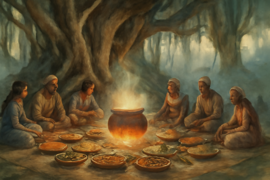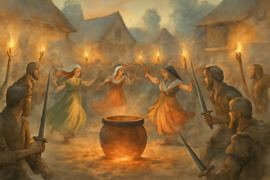Introduction
On the edge of the dense forests of Vindhya Hills, an old potter’s humble home looked toward the first rays of dawn. In the dim orange glow, the earthenware lined the walls like silent sentinels. Ramachandra, his name meaning “servant of the moon,” woke before sunrise, his hands rough with years of shaping clay and soul-stirring tales. He lived with his daughter, Leela, whose laughter brought light into all corners of their simple life. Yet despite their contentment, shadows of hunger crept in with every passing season, for drought and heavy taxes left their village thin. One cool morning, as dew gleamed along the path to the forest, Leela and Ramachandra set out to gather yakshi fruits for income. In a secluded glade, Leela spied a copper pot half-buried in moss. When she brushed it clean, the pot spoke with a soft, echoing voice and promised endless bounty to the kind-hearted who opened its lid. At first, they thought it a trick of the wind, the whisper of spirits famed in local legend. But when Ramachandra lifted the lid, he found fine rice pouring forth by the bowlful, accompanied by fragrant curries that simmered as if conjured by unseen cooks. Word spread through the settlement like wildfire. Neighbors arrived, eyes wide with wonder and greed, pressing to touch the miraculous vessel. Intrigued and anxious, the local headman summoned the village priest for counsel. Under the banyan tree, the priest warned: “Unchecked magic is a double-edged blade. What feeds hunger may also carve strife.” Yet the promise of plenty was too strong. That night, the pot poured sweets and gold coins, strings of pearls and silver lamps. Ramachandra and Leela celebrated under a canopy of lanterns, unaware that every gift the pot bestowed bore a hidden price. In towns beyond the hills, tales of the magical vessel traveled by caravan, stirring jealousy and covetous schemes. When strangers arrived seeking to seize the pot for themselves, the fragile fabric of village unity began to unravel. Through elaborate feasts and glittering festivals, magic led to arrogance. The farmers hoarded grain, merchants raised prices, and villagers turned on one another as suspicion gnawed at their hearts. Deep in his soul, Ramachandra sensed the warning in the priest’s trembling voice. He carried the pot back into the forest’s heart, hoping to restore balance. But the pot, alive with its own will, resisted. Branches cracked, winds roared, and the earth trembled as magic exacted its due. In that chaotic moment, Ramachandra made a choice: he would relinquish greed for the sake of all. With one final plea, he sealed the pot’s mouth, and an earth-shaking calm fell upon the clearing. The pot lay silent and cold, its gifts forever stilled. Wiser for the ordeal, the potter and his daughter returned to their village carrying no treasure but a new sense of unity and humble joy. The famine passed, the rains returned, and in every bowl of steaming rice, the people tasted not enchantment, but working hands and shared laughter.
The Discovery and First Miracles
Ramachandra and Leela often walked the winding forest path just after sunrise, searching for wild fruits and secret springs. Birds heralded their arrival, singing in flutelike notes. One dawn—so thick with mist it seemed the world was suspended in a silvery dream—Leela slipped on a patch of slick moss and tumbled forward. Her small hand struck something hard. Peering down, she saw a copper vessel carved with swirling vines and dancing peacocks. She called to her father, who wiped moss away to reveal ancient inlaid patterns that shimmered in the soft light. As he lifted the lid, a warm glow exhaled like a sigh of relief. Together, in astonished silence, they held the rim of the pot and watched slender streams of jasmine rice begin to flow, each grain heavy and fragrant. Leela tasted one, rolling it on her tongue as if discovering fire for the first time. They carried handfuls back to the village—a gift too lavish to measure—and watched in amazement as each ladleful refilled itself endlessly. Word spread with the speed of a startled deer across thorny scrub and paddy fields. The village, once lean from failed crops, now overflowed with boiled lentils and sugared grains. Ramachandra, a humble potter, found himself celebrated as a sage. The local headman entertained dreams of turning their hamlet into a center of pilgrimage. Yet beneath the fanfare, the potter's heart throbbed with uneasy joy.

As villagers lined up at dawn, the copper pot sat upon a carved wooden stand beneath the banyan tree. The priest, clad in saffron robes, circled the vessel with incense in trembling hands. He murmured prayers that asked not only for blessings, but for protection from overreach. Shadows lengthened, and the pot glowed as if emboldened by the priest’s recitation. The headman’s greed shimmered in his eyes. He resolved to guard the treasure, yet hunger for more twisted his conscience. Families began hoarding rice, neighbors bartered away prized cattle for handfuls of lentils. Ramachandra, troubled by the gathering clouds of discord, consulted the priest under starlight. Candle flames danced over the priest’s lined face as he whispered, “This is no mere vessel, but a test of hearts. Magic without wisdom invites ruin.” Yet the pot offered irresistible temptation. Each dawn, the gifts grew richer—jewels glinting like captured sunbeams, silken cloths embroidered with gold. Soon outsiders arrived: jewelers, traders, and even soldiers from distant provinces, drawn by rumors of supernatural largesse.
Another dawn, when the glade spilled sunlight like molten gold, Ramachandra returned the pot to the forest, hoping to dim its allure. But forest spirits, awoken by the pot’s hum, stirred. Branches snapped, and wind shrieked. The old trees arched in warning. Ramachandra’s heart pounded like a drum. Gently, he pressed the lid shut. Silence fell. The pot’s singing ceased. A solitary bird called out, then settled to preen its feathers, as if peace had returned. Hand in hand, potter and daughter retraced their steps, the empty vessel hidden beneath a cloak of ferns. As they crossed back into the village, they found the people gathered in fearful hush. With no magic to rush through the market stalls, anger and confusion flashed like lightning. But Ramachandra spoke with calm authority: “Our fortune never lay in gold or rice, but in our hands and our hearts.” Over days, the villagers remembered how they labored, shared, and celebrated simple harvests. Bonds reforged. And though the pot lay silent, its lesson endured: that unchecked power demands careful stewardship.
The Spread of Greed and Strife
When news of the pot reached the town beyond the hills, merchants descended in caravans, their camels laden with spices from Malabar and silks from Kashi. They arrived at dawn, their pages of ledgers fluttering in the breeze, eyes gleaming at the promise of effortless wealth. The headman, now drunk on dreams of power, welcomed them. He stated boldly that the pot would be used to fill the king’s granaries and forge alliances with neighboring princes. But some elders bristled at the loss of autonomy. They recalled simpler times, when the village thrived by sowing seed with sweat and patience. Tension crackled like an undammed fire. Families split into camps—those who worshiped the magic pot as a divine boon, and those who feared it as a perilous idol. Ramachandra and Leela walked the dusty lanes, hearts heavy. Mothers guarded terrified children. Shopkeepers raised prices by the flick of a finger. Farmers locked their granaries. The pot’s endless gifts had lit a spark of envy in every heart.

Amid the growing unrest, the headman proposed a nightly festival, hoping that communal celebration would quench the sour winds of discord. Lanterns swayed along bamboo poles; dancers twirled in saffron skirts; drummers pounded rhythms that made the ground tremble. At the center, on an altar of alabaster, the pot glowed with slow pulsing light. The festival began with prayers of thanksgiving. Then merchants offered gold coins; nobles presented jeweled swords; priests chanted hymns of blessing. But as wine passed from hand to hand, voices rose in boasting. Young men wagered bets on how quickly the pot could refill a fully loaded cart. Merchant caravans set gauntlets at one another’s feet. In whispered conspiracies, they plotted to seize the pot and claim the entire fortune. The merriment curdled into mistrust.
One night, under a crescent moon, the pot hummed like a living heart. That rhythm echoed through the forest, summoning forces older than memory. Branches snapped against each other. A whirlwind of golden rice and flying coins scattered across the fields. Horses bolted. Dogs howled. The earth rumbled as if angry with humankind’s folly. Ramachandra and Leela rushed to the clearing. There, the pot quivered on its stand, tangled in vines that writhed as if alive. The villagers, awakened by the uproar, flooded the square. Torches blazed. Each person turned on their neighbor, blaming them for the madness. Swords glinted under the torchlight. The headman bellowed for calm, but his voice was drowned by the swirl of chaos. Vines tightened around the pot like serpents drawing prey. Ramachandra knew the test had come to its greatest trial. With eyes burning bright, he stepped forward and raised his voice above the din: “It is not the pot that enslaves us, but our own desires!” In that piercing moment, a hush settled. The vines paused. Torches flickered. Every beating heart felt the weight of the potter’s words. Silently, they realized that true power lay not in possessions, but in the courage to let go of what enslaves us.
Restoring Balance and Lasting Wisdom
When dawn came, its light was pale and trembling. The carnage of the night before lay strewn in discarded lanterns, shattered pottery, and bruised spirits. In the center of the square, Ramachandra knelt before the copper vessel, now wrapped in thick vines that writhed with a life of their own. Leela stood behind him, her small hand on his shoulder, steadying his resolve. Around them, the villagers watched in reverent hush. The headman, humbled and shaken, approached with tears in his eyes. “Forgive me, friend,” he whispered, bowing low. Others followed, laying offerings of wildflowers, rice grains, and fresh water at the pot’s base. No one spoke of kings or riches; their only request was guidance for harmony. In that solemn moment, Ramachandra slipped his hand under the pot’s lip and closed the lid with gentle but resolute force. The humming ceased as abruptly as it had begun. Vines recoiled, then settled like autumn leaves at rest.

A serene silence enveloped all. Birds drifted from the treetops, warblers and bulbuls alighting upon rooftops. In the hush, one could hear the distant rush of the Vindhya River, a reminder of life’s steady flow. Ramachandra rose, the weight of years in his bones, yet free of the burden that had threatened them all. He spoke with calm authority: “This vessel was never meant for endless greed. Its true gift lies in teaching us to share our work, to honor our bonds, and to govern our desires.” Leela stepped forward and set two small gourds of fresh spring water upon the pot. “We keep only what we need, Father,” she said. “The rest we give back to the earth and to each other.” The villagers echoed her words in a soft chorus. Together they carried the pot into the forest’s heart, depositing it beneath an ancient peepal tree. They wove garlands of jasmine and marigold, protecting the vessel with prayers of mindfulness rather than worship of its magic.
Years passed. The fields flourished not because rice flowed from a pot, but because every man and woman labored under sun and rain with patient care. Festivals returned, but their joy sprang from shared dance and song, not spectacle of supernatural bounty. Leela grew into a wise storyteller, recalling the pot’s lessons to children at her knee. Ramachandra’s hands, still rough from shaping clay, molded simple bowls for daily use, each vessel a reminder that true abundance is earned together. And the forest, with its hidden pot silent beneath the peepal’s roots, whispered in the wind that the most potent magic lies in the strength of community and the grace of a well-governed heart.
Conclusion
Ramachandra’s pot, now silent beneath the sacred peepal tree, remains a testament to the delicate balance between power and humility. The villagers learned that no miracle—no matter how grand—can replace the steady rhythm of shared toil, the bonds of trust, and the careful tending of heart and land. In this ancient folktale, the magic pot serves not just as a vessel of rice or gold, but as a mirror reflecting human desire. Its gift illuminated both the splendor and the peril in unchecked longing. Millennia may pass, kingdoms may rise and fall, yet the lesson endures: when we honor our neighbors, govern our appetites, and share the fruits of our labor, we unlock the truest form of abundance. In every bowl of rice passed from one hand to another, the spirit of Ramachandra’s wisdom lives on—a living legacy of restraint, compassion, and the unity that transforms fleeting magic into lasting harmony. This moral ring echoes in every home, reminding generations that the greatest treasure is a heart governed by wisdom, not a pot overflowing with unbridled magic.

















